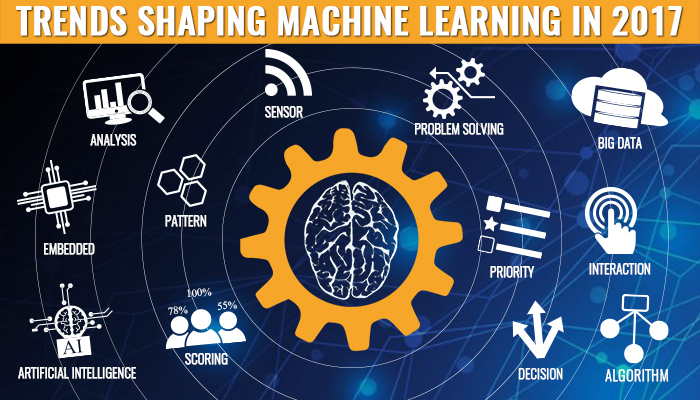
Technologies in the field of data science are progressing at an exponential rate. The introduction of Machine Learning has revolutionized the world of data science by enabling computers to classify and comprehend large data sets. Another important innovation which has changed the paradigm of the world of the tech world is Artificial Intelligence (AI). The two technological concepts, Machine Learning and Artificial Intelligence, are often used as interchangeable terms. However, it is important to understand that both technologies supplement each other and are essentially different in terms of their core functions.
It is often predicted by technology enthusiasts and social scientists that human beings in the workforce will soon be replaced by self-learning robots. It is yet to be seen whether there lies any truth in these predictions or not but for 2017, the following trends have been prominent in the development of Machine Learning.
Giant companies will develop Machine Learning based Artificial Intelligence systems
In 2016, we saw many prominent developments in the domain of Machine Learning, and numerous artificial intelligence applications found a way to our phone screens and caught our attention. In the previous year, companies just touched the tip of the iceberg and in 2017, we will continue to see more developments in the field of machine learning. Big names such as Amazon, Google, Facebook and IBM are already fighting a development war. Google and Amazon launched successful apps, which include Amazon Echo and Google Home, at the beginning of the year, and we have yet to see what these tech giants have in stores for their customers.
Algorithm Economy will be on the Rise
Businesses greatly value data to take the appropriate actions, whether it is to understand the consumer demand or comprehend a company’s financial standing. However, it is not the data alone they should value because without an appropriate algorithm, that data is worth nothing. Peter Sondergaard, Senior Vice President of Gartner Research, says that, “Data is inherently dumb and the real value lies in the algorithms which deduce meaningful results from a cluster of meaningless data”.
Algorithm Economy has taken center stage for the past couple of years, and the trend is expected to follow as we expect to see further developments in machine learning tools. The use of algorithm economy will distinguish small players from the market dominators in 2017. Small businesses that have just entered the transitional phase of embedding machine learning processes in their business models will be using canned algorithms in tools such as BI, CRM and predictive analysis. On the contrary, large enterprises will use proprietary ML algorithms.
Expect more Interaction between Machine and Humans
Google Home and Amazon Echo received an exceedingly positive response from the audience which made it evident that consumers perceive human-machine interaction positively. Innovative technologies embedded with machine learning processes prove to be helpful under various circumstances; for example, helping people with eyesight issues to navigate. But will they completely replace human-human interaction? Maybe 25 years down the road, but we do not see that happening anytime soon. Machine learning has made it increasingly possible for machines to learn new skills, such as to sort, analyze and comprehend. But nevertheless, there are certain limitations to it. Automated cars have frequently been tested, and even with modified algorithms and advanced technologies, the chance of an error is still present. This example alone is enough to convince that machines will not completely replace humans, at least not anytime soon.
Conclusion
Machine learning and Artificial Intelligence is a promising field with much potential for growth. We have seen some recent developments in the sector which, not long ago, people believed were not possible. Therefore, we cannot give a definite verdict regarding the industry’s potential for growth. However for now, intelligent machines are only capable of handling the repetitive tasks and can follow a predetermined pattern. It lacks the skill to figure out things which are out of the ordinary, and we still require human intervention for keeping the chaos at bay in such situations.
Ronald van Loon is Advisory Board Member and Big Data & Analytics course advisor for Simplilearn. He will contribute his expertise towards the rapid growth of Simplilearn’s popular Big Data & Analytics category.
If you would like to read Ronald van Loon future posts then please click ‘Follow‘ and feel free to also connect on LinkedIn and Twitter to learn more about the possibilities of Big Data .


